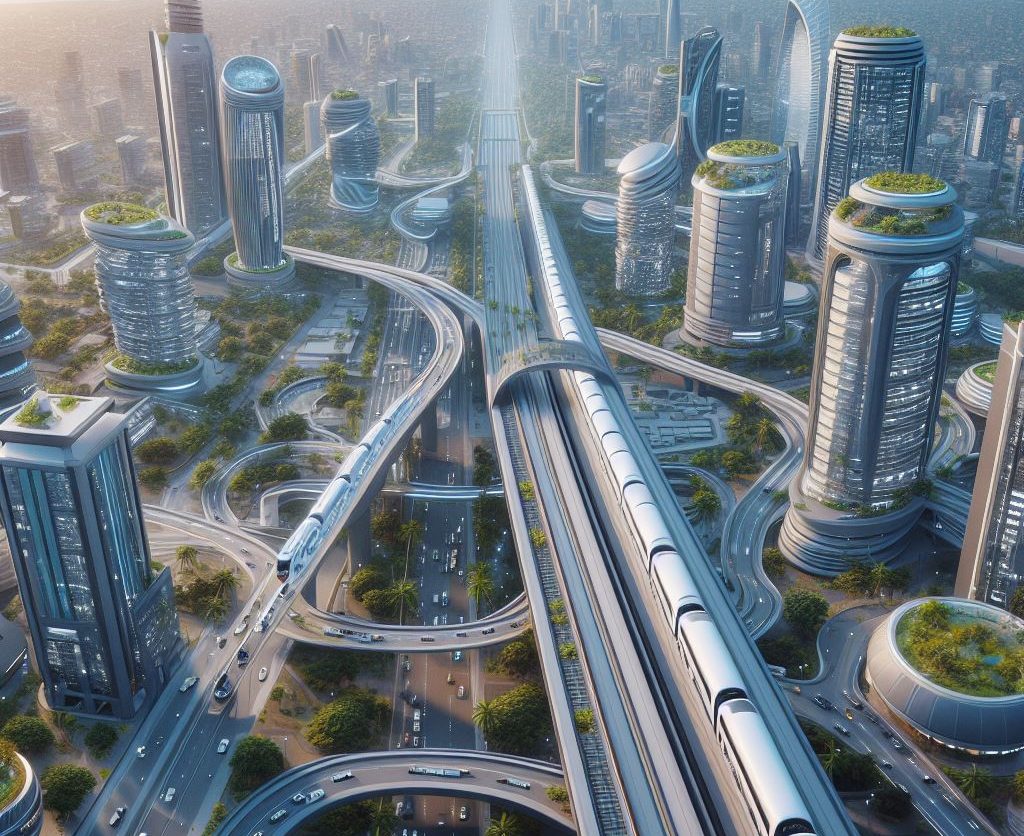Accra, Ghana’s bustling capital, is a city of vibrant culture and rapid growth. As it stands on the cusp of further urban development, envisioning a future that integrates robust public transportation, climate resilience, and technological advancement is crucial for sustainable progress.
Currently, Accra has been falling behind in some standards. The city has been ranked as one of the most polluted major cities globally with an Air Quality Index (AQI) of 371, falling into the “hazardous” category.
Public transportation is sadly still far beyond with projects like the Rapid Bus Transit System ultimately failing due to bad planning and mismangement.
So what does the future of Accra look like if we were to envision it 10 years from now? How can it improve to be a more livable city?
Here’s a look at what the future of Accra could and should look like to meet these challenges head-on.
Public Transportation: The Backbone of Urban Mobility
A forward-looking Accra must prioritize a comprehensive, efficient, and sustainable public transportation system. The current reliance on informal transport services, like tro-tros and shared taxis, while essential, needs to be supplemented and eventually transformed by more organized systems.
Here are key elements for future improvements:
Integrated Transit Networks
Establish a seamless integration of bus rapid transit (BRT), light rail, and electric buses. This network should connect all major neighborhoods, commercial areas, and surrounding suburbs, reducing reliance on private cars and easing traffic congestion.

Smart Ticketing Systems
Implement digital payment systems that allow commuters to use a single card, mobile app, or USSD across all modes of public transport. This not only enhances convenience but also improves data collection for transit planning.
Non-Motorized Transport Infrastructure
Develop extensive pedestrian and cycling paths to promote walking and cycling as viable alternatives for short-distance travel. Safe, well-lit, and well-maintained pathways can encourage a healthier, eco-friendly urban lifestyle.
Some buildings in Accra are energy efficient and are LEED certified including the Ridge Hospital, Tema Port–Terminal 3, CalBank Head Office, Takoradi Mall, Atlantic Tower, Pullman Hotel Accra, and the World Bank Office.
Electric and Autonomous Vehicles
Invest in the infrastructure for electric vehicle (EV) charging stations and explore the potential for autonomous buses in less congested routes. This aligns with global trends towards reducing carbon footprints and embracing innovative transport solutions.
Climate Resilience: Building a Sustainable City
As climate change poses increasing threats, Accra’s future must be designed with resilience in mind. Strategies to mitigate and adapt to climate impacts include:
Green Infrastructure

Expand green spaces, such as parks, urban forests, and green roofs. These not only improve air quality and provide recreational areas but also help manage urban heat islands and stormwater runoff.
As of 2017, Singapore possessed 100 hectares of skyrise greenery (rooftop gardens and green walls) and aims for 200 hectares by 2030.
Flood Management Systems
Strengthen flood management infrastructure, including advanced drainage systems, retention basins, and permeable pavements to handle heavy rains and prevent urban flooding.
Sustainable Building Practices
Some buildings in Accra are energy efficient and are LEED certified including the Ridge Hospital, Tema Port–Terminal 3, CalBank Head Office, Takoradi Mall, Atlantic Tower, Pullman Hotel Accra, and the World Bank Office.
Accra can promote the construction of energy-efficient buildings with sustainable materials and enforce building codes that require new constructions to incorporate solar panels, rainwater harvesting systems, and energy-efficient designs.
Renewable Energy Integration
Accelerate the transition to renewable energy sources such as solar and wind. Encourage households and businesses to adopt renewable energy solutions through incentives and supportive policies.

Technological Advancement: A Smart City Vision
Technology is the key to transforming Accra into a smart, efficient, and connected city. Future developments should include:
Smart City Infrastructure
Implement IoT (Internet of Things) solutions to manage urban resources more effectively. Smart traffic lights, waste management systems, and energy grids can significantly improve operational efficiency and reduce costs.
Digital Governance
Develop e-governance platforms to streamline public services, enhance transparency, and improve citizen engagement. This includes online portals for permits, tax payments, and public feedback.
High-Speed Internet Access
Ensure widespread access to high-speed internet across all areas of the city. This will support digital education, remote work, and access to global markets, fostering economic growth and inclusivity.
Innovation Hubs
Establish technology and innovation hubs to nurture local talent and attract global tech companies. These hubs can provide training, resources, and networking opportunities to foster a vibrant tech ecosystem.

Conclusion
The future of Accra should be marked by a robust public transportation network, climate-resilient infrastructure, and cutting-edge technological advancements. By embracing these changes, Accra can improve the quality of life for its residents.
This vision requires the collaboration of government, the private sector, and civil society to transform the city into a model of innovation and resilience for the future.
Catch up on news and other tidbits on our WhatsApp Community Page, Twitter/X, and subscribe to our weekly newsletter to ensure you don’t miss out on any news.










